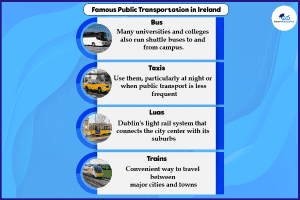Ireland: Safety Tips for International Students [#10 is Must]

Studying abroad can be an exciting and life-changing experience, but it can also be intimidating, especially regarding safety concerns.
Ireland is generally a safe country for international students, but taking precautions is still important to ensure your safety and well-being.
This blog will discuss some safety tips for international students in Ireland.
1. Get Familiar with Your Surroundings
Safety is how you get along with your surroundings. When you arrive in Ireland, take some time to get familiar with your surroundings.
Familiarize yourself with the area where you will be living and studying.
Here are a few of several tips for international students that come in handy when they are set out in a new but still exciting surrounding in Ireland,
- Note any landmarks, if any, to find in an emergency.
- Learn the local emergency numbers and keep them saved on your phone.
- Attend your university’s orientation event and learn about the campus, accommodation options, local transport, and more.
- Explore the city to get a feel for the local culture and way of life.
- Use Ireland’s extensive public transport network.
- Irish people are friendly and don’t hesitate to ask for help when needed.
2. Travel in Groups
When you’re out and about, it’s always safer to travel in groups.
Avoid walking alone at night, especially in areas that you’re not familiar with. Stick to well-lit areas and avoid shortcuts through dark alleys or isolated areas.
3. Use Public Transportation Safely
Public transportation is generally safe in Ireland, but being vigilant and aware of your surroundings is essential.
Keep an eye on your belongings at all times, and avoid carrying large amounts of cash or valuable items.
If you’re travelling by bus, sit near the driver or other passengers, and try to avoid empty buses or late-night services.

Students can purchase student tickets for public transportation, which often offer discounted rates.
To enhance international students’ safety and time, many public transport providers offer mobile apps and online services that do planning and paying for trips easy.
4. Be Cautious with Your Personal Information
Be cautious with your personal information, especially online.
Avoid sharing personal information such as your address, phone number, or bank details online, and never give this information to someone you don’t know.
Be wary of scams and phishing emails, and never click on links or download attachments from unknown sources.
5. Be Aware of Cultural Differences
When studying in a new country, it’s important to be aware of cultural differences and respect local customs and traditions.
What may be acceptable in your home country may not be acceptable in Ireland, so it’s important to research and learn about the local culture.
This will help you to avoid misunderstandings and potential conflicts, thus keeping you safer in a foreign land.
Here are some tips to help you understand and navigate cultural differences in Ireland:
- Learn about Irish history and culture
- Observe local customs
- Be aware of non-verbal communication
- Respect cultural differences
- Get involved in local activities
Pro Tip: Irish people value politeness and respect, so it’s important to use “please” and “thank you” when interacting with others. |
6. Keep Your Accommodation Secure
A safety tip for international students in Ireland is unfinished without discussing accommodation.
Ensure your accommodation is secure and all doors and windows are locked when you leave.
If you’re living in a shared house or apartment, be mindful of your housemates and ensure everyone is on the same page regarding security.
If you’re staying in a hostel or hotel, use the provided lockers or safes to store your valuables.
Pro Tips:
|
7. Stay Informed about Local Events and News
Stay informed about local events and news by reading local newspapers and news websites.
This will help you to stay up-to-date on any potential safety concerns or issues in your area.
You can also sign up for alerts from your embassy or consulate to receive important updates and notifications.
8. Take Care of Your Mental Health
Maintaining sound mental health is paramount to staying safe in a country abroad while studying.
Things can be stressful and overwhelming, so taking care of your mental health is important.
Ensure you get enough sleep, eat a balanced diet, and stay active.
It’s also a good idea to connect with other international students and join clubs or organizations that interest you.
Pro Tip: If you’re struggling, don’t be afraid to seek help from a mental health professional or your university’s counselling services. |
9. Learn some basic Self-defence Techniques
If you want to gift yourself before leaving your home country, teach yourself the art of self-defence.
You wouldn’t realize how much confidence and security you can gain from some basic self-defence techniques.
Consider taking a self-defence class or workshop and practising basic techniques such as breaking free from a wrist grab or delivering a knee strike.
10. Be Prepared for Emergencies
……and finally, be prepared for emergencies by having a plan in place.
Research emergency services: Before you travel, research the contact number for the local emergency services, the location of the nearest hospital, and the contact information for your embassy or consulate.
Register with your embassy or consulate: Register with your embassy or consulate in your host country. This will help them locate you in an emergency and provide assistance if necessary.
Learn basic first aid: Keep yourself equipped to treat your basic illness and minor injuries.
Keep important documents safe: Always have multiple copies to replace them if lost or stolen.
Stay informed: Stay up-to-date with local news and events, particularly during political or social unrest.
Have a plan: Develop an emergency plan with your family, friends, or roommates so they know what to do if you cannot contact them in an emergency. Make sure that you have a fully charged phone with emergency numbers.

Request a Call Back
Comments are closed.